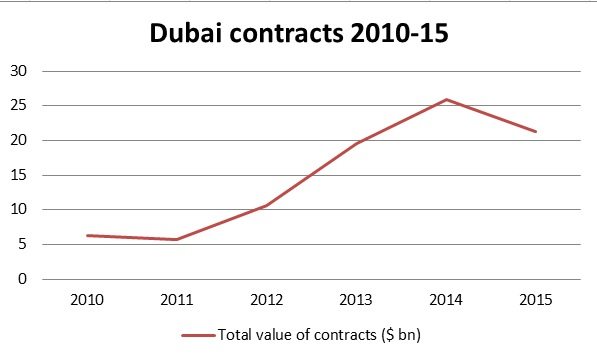

Market aims to return to growth in 2016 with string of major awards
There were plenty of announcements and a fair amount of tendering, but on balance 2015 was a disappointment for contractors looking for new work in Dubai.
According to data from MEED Projects, 2015 was the first year of negative growth for construction contract awards since the market bottomed in 2011. There were $21.3bn of contract awards, which was about 18 per cent less than the nearly $25.9bn of contracts awarded in 2014.
With a difficult year behind it, in 2016 the market will be hoping for a return to positive growth.

Dubai contract awards
Budget growth
The emirates budget, for which details were released in late December, includes an increase in spending on infrastructure in 2016. That means AED6.4bn ($1.7bn) will be spent on infrastructure in 2016, and this figure will be supplemented by investments made in new assets by government-related entities (GREs) and the private sector.
There are already early signs that 2016 will be a better year as clients prepare to award a series of major contracts during the first six months of the year.
The state-controlled Investment Corporation of Dubai (ICD) is leading the charge. It has already selected contracting joint ventures for early works contracts for two of its schemes in Dubai and main construction contract awards are expected in the second quarter of the year.
Both joint ventures include South Koreas Ssangyong Engineering & Construction. ICD bought a controlling stake in the company for about $181m in February 2014.
For the expansion of the Atlantis resort on the Palm Jumeirah, ICD has selected a joint venture of Ssangyong and the local/Belgian Bel Hasa Six Construct. For the ICD Brookfield Place at Dubai International Financial Centre, which ICD is developing in joint venture with Canadas Brookfield Multiplex, a joint venture of Ssangyong and Brookfield Multiplex has been selected.
Local developer Nakheel is also preparing to award deals. Ssangyong, in joint venture with China State Construction Engineering Corporation, is the frontrunner for the contract to build its Gateway towers project at the base of the Palm Jumeirah. The scope of work involves building three high-rise towers, with an expected cost of about AED3bn.
Infrastructure schemes
Government clients are also expected to award major infrastructure contracts. The most high profile is the extension to the Dubai Metro, which will link to the Expo site.
The Roads & Transport Authority (RTA) is preparing to receive bids on 17 January for the design-and-build deal.
At least eight groups are prequalified to bid, and five groups are expected to submit offers.

Known as Route 2020, the scheme involves building a 15-kilometre-long line branching off the existing Red Line at the Nakheel Harbour & Tower station, between the Ibn Battuta Mall and Jumeirah Lake Towers stations.
Dubai Municipality is also preparing to award the deal to expand its Jebel Ali sewage treatment plant. In December, Bel Hasa Six Construct submitted a low bid of AED1.3bn for the contract.
Dubai Electricity & Water Authority (Dewa) will also play a leading role in 2016. It has approved a total budget of about AED23.7bn for 2016, which includes an increase in spending on capital schemes.
It says AED8.7bn will be allocated to capital expenditure and projects, compared with almost AED8bn in 2015.
The 2016 budget includes several key projects, including about AED3bn in generation, AED3.4bn in power transmission, AED1.2bn in power distribution, and AED1.04bn in water and civil, in addition to other amounts totalling AED95m.
Power plants
The two largest new schemes for which contract awards are expected in 2016 are the Hassyan coal-fired power plant and the third phase of the Mohammed bin Rashid al-Maktoum Solar Park.
In October last year, Dewa selected the consortium of Saudi Arabias Acwa Power and Chinas Harbin as the preferred bidder for the 1,200MW Hassyan independent power project (IPP).
The Acwa/Harbin team was selected as the preferred bidder, with a levelised cost of energy tariff (LCOE) of 4.501 cents a kilowatt hour (kWh).
In December last year, Dewa received 21 requests for qualification (RFQs) for the 800MW third phase of the solar park.
Like the first two phases of the solar park, the third phase will use photovoltaic (PV) solar technology. It will be developed as an IPP. If developed as planned in one stage, it will be the largest single-phase solar scheme in the world.
While these contract awards alone will not return Dubais projects market to positive growth in 2016, they will underpin its performance. The government and its related entities cannot do this on their own.
To change the trajectory of the market, the private sector needs to award contracts. With confidence rocked by low oil prices, a softening real estate market and an increasingly troubled geopolitical outlook, the injection of confidence that government investment in infrastructure brings will be well received. The question is: will it be enough to get the private sector moving?
You might also like...

UAE rides high on non-oil boom
26 April 2024

Qiddiya evaluates multipurpose stadium bids
26 April 2024

Al Ula seeks equestrian village interest
26 April 2024

Morocco seeks firms for 400MW wind schemes
26 April 2024
A MEED Subscription...
Subscribe or upgrade your current MEED.com package to support your strategic planning with the MENA region’s best source of business information. Proceed to our online shop below to find out more about the features in each package.





